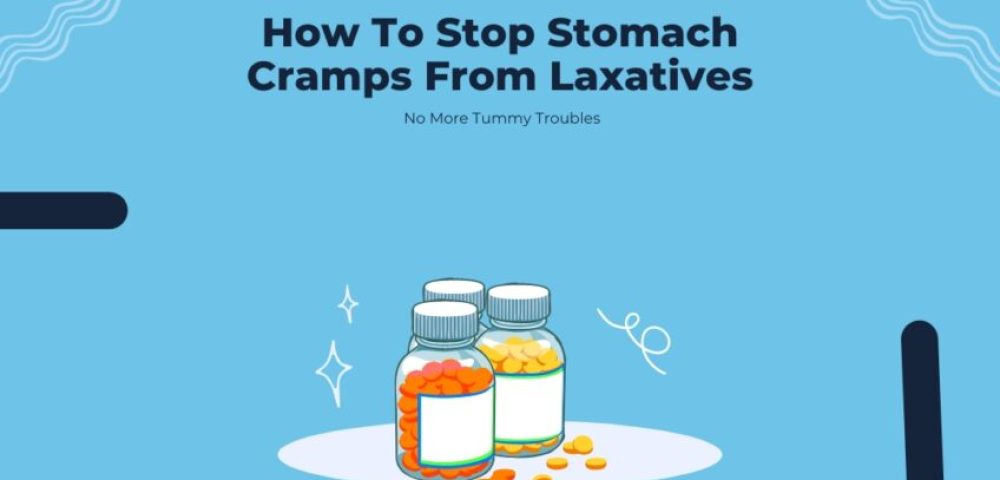Laxatives are often used to relieve constipation, but they can also cause stomach cramps and discomfort. If you’re experiencing stomach cramps after taking laxatives, it can be very uncomfortable and even painful. Fortunately, there are several things you can do to ease the discomfort and prevent further cramping.
In this article, we will discuss the common causes of stomach cramps from laxatives and some tips on how to relieve them. It’s important to note that severe stomach cramps may indicate a more serious issue and you should seek medical attention immediately. However, for mild to moderate cramps, the following tips can be helpful in providing relief.
Page Contents
- 1 Why are laxatives used?
- 2 Types
- 3 Which laxative is suitable for you, then?
- 4 Side effects
- 5 Laxatives and Eating Disorders
- 6 Easing Stomach Cramps
- 7 FAQ
- 7.1 Can laxatives cause dehydration?
- 7.2 Can you overdose on them?
- 7.3 Can laxatives affect birth control?
- 7.4 Can cause stomach cramps?
- 7.5 Can they cause rectal bleeding?
- 7.6 Can laxatives cause weight loss?
- 7.7 Can they be used for long-term treatment of constipation?
- 7.8 Can natural laxatives be just as effective as over-the-counter laxatives?
- 8 Conclusion
Why are laxatives used?
Laxatives are medications or substances used to promote bowel movements and alleviate constipation. They work by increasing the amount of water in the stool or stimulating the muscles in the intestines to move the stool through the digestive tract.
Laxatives are commonly used to treat occasional constipation, as well as in the management of certain medical conditions such as irritable bowel syndrome (IBS) and opioid-induced constipation.
However, excessive or prolonged use of laxatives can lead to negative side effects such as stomach cramps, bloating, diarrhea, and dehydration. In this article, we will focus on how to alleviate stomach cramps caused by laxative use.
Types

Laxatives are a type of medication that help to stimulate bowel movements and relieve constipation. They work by either increasing the amount of water in the stool, lubricating the intestinal walls, or stimulating the muscles in the intestines. Laxatives are commonly used to treat occasional constipation, but they can also be used to manage chronic constipation, certain bowel disorders, and as a preparation for medical procedures such as colonoscopies.
There are different types of laxatives, each working in a different way to relieve constipation. Some of the most common types of laxatives include:
Lubricant laxatives
Lubricant laxatives are a type of laxative that works by coating the stool and intestinal lining with a slippery substance, making it easier to pass. They are typically used for short-term relief of constipation or to help ease bowel movements in people with hemorrhoids or anal fissures.
Common lubricant laxatives include mineral oil and glycerin suppositories. Mineral oil is a liquid that is taken orally, while glycerin suppositories are inserted rectally. Both types of lubricants work by coating the stool and intestinal lining with a slick layer, which helps ease the passage of stool.
Bulk-forming laxatives
Bulk-forming laxatives are used to treat constipation by increasing the bulk and water content of stools. They work by absorbing water in the intestines, which softens the stool and makes it easier to pass.
These types of laxatives usually contain natural or synthetic fiber and are available as powders, tablets or capsules. Examples of bulk-forming laxatives include psyllium, methylcellulose and polycarbophil.
It’s important to drink plenty of water when taking bulk-forming laxatives to avoid intestinal blockage. These laxatives can take up to three days to produce a bowel movement.
Saline laxatives
Saline laxatives are types of laxatives that work by drawing water into the colon and softening the stool. They contain salt and other minerals that help increase the osmotic pressure in the gut, which in turn increases the amount of water that is retained in the colon. This makes the stool softer and easier to pass.
They work relatively quickly and can provide relief from constipation within a few hours. They are available over the counter and come in different forms, including powders, liquids, and tablets. Examples of saline laxatives include magnesium citrate, magnesium hydroxide (Milk of Magnesia), and sodium phosphate.
Osmotic laxatives
Osmotic laxatives work by drawing water into the colon to soften stool and make it easier to pass. They are also known as stool softeners and are often used for constipation caused by medication, dehydration, or a lack of fiber in the diet.
They come in several forms, including powders, liquids, and pills. Some common types of osmotic laxatives include magnesium citrate, lactulose, and polyethylene glycol (PEG).
Magnesium citrate is a saline laxative that is often used to prepare for medical procedures or surgeries. It comes in liquid form and is taken orally. Lactulose is a synthetic sugar that is also taken orally and works by increasing the water content and volume of stool. PEG is a powder that is mixed with water and taken orally. It works by drawing water into the colon and increasing the frequency of bowel movements.
Stimulant laxatives
Stimulant laxatives are another type of laxative used to relieve constipation. They work by stimulating the muscles in the intestines to contract, which helps to move stool through the digestive system.
They usually work within 6 to 12 hours after taking them, and they should not be taken for an extended period. They can cause cramping, diarrhea, and abdominal discomfort, especially if taken in high doses or for an extended period.
Examples of stimulant laxatives include senna, bisacodyl, and castor oil. These laxatives are available in various forms, including tablets, capsules, suppositories, and enemas.
Suppositories
Suppositories are a type of laxative that is inserted into the rectum to help stimulate bowel movements. They come in a variety of forms, including glycerin, bisacodyl, and docusate sodium.
They work by softening stool and lubricating the rectum, making it easier for fecal matter to pass. They can provide quick relief for constipation and are often used as a last resort when other types of laxatives have not been effective.
However, it is important to follow the instructions carefully and not overuse suppositories, as they can cause irritation or damage to the rectal tissue.
Stool softener
Stool softeners, also known as emollient laxatives, work by making the stool softer and easier to pass. They are commonly used to treat constipation or to prevent straining during bowel movements, which can lead to hemorrhoids or anal fissures.
They function by drawing water into the colon and softening the stool, making it easier to pass without causing any additional strain or discomfort. They are typically taken orally in pill or liquid form and can take anywhere from 12 to 72 hours to produce a bowel movement.
Theodore is a prolific author at Fischer Institute, known for his insightful articles on health and nutrition. His expertise spans a wide range of topics, from the benefits of traditional foods to the latest in health trends, always aiming to educate and empower readers towards better wellbeing.















